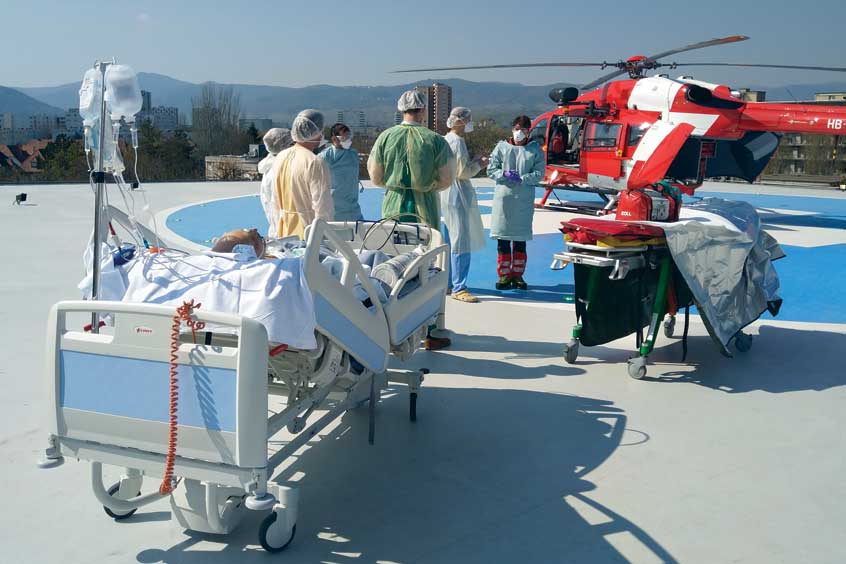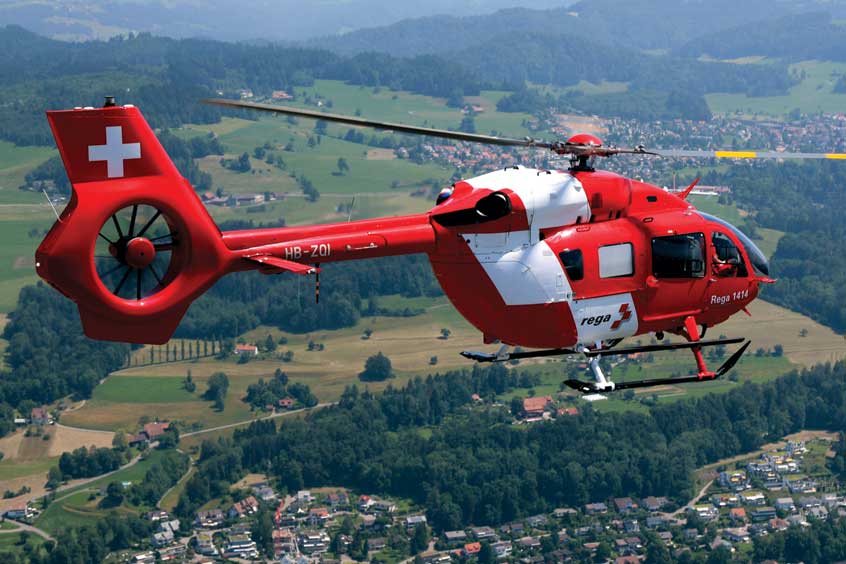Why visit ACE ’25?



Since the start of the corona pandemic, Rega's helicopter crews have flown a total of 74 COVID-19 patients, most of them for transfers from one hospital to another. Rega has also provided support abroad: For example, French COVID-19 patients were flown from Alsace to German hospitals. In general, however, since the pandemic began, Rega has recorded significantly lower numbers of helicopters, which can be attributed to the changed leisure behaviour of the Swiss population.
The first transport of a patient suffering from COVID-19 on board a Rega helicopter took place on March 11 in Ticino. The patient was flown from Mendrisio to Locarno by the crew of the Rega base in Locarno. Thereafter, the number of missions related to the coronavirus has increased: Between March 11 and Saturday, April 11, the helicopter crews flew a total of 74 Covid-19 patients. Most of these operations were so-called secondary transports, in which patients were transferred from one hospital to another.
Around two thirds of these secondary transports were so-called intensive care special transports of artificially ventilated Covid-19 patients. During the transfer to the intensive care unit of a hospital, the Rega crew connects the patients to a mobile ventilator that ensures the oxygen supply for the entire duration of the transport. All Rega helicopters are equipped with the latest mobile ventilation devices that meet the latest standards and are specially certified for use in rescue helicopters.
If there was enough capacity, the Rega crews also helped out in neighbouring countries: Among other things, they flew several French Covid-19 patients from Alsace to German hospitals or transferred patients within Germany. Although the transport of highly infectious patients is part of Rega's normal range of operations, the crews had been specifically prepared for training again in February with a view to an increase in such operations.
In order to ensure medical care from the air in Ticino even in poor visibility conditions and to be able to fly patients to a hospital in German-speaking Switzerland in the event of capacity bottlenecks, Rega received new exemptions for instrument flight procedures from the Swiss Federal Office of Civil Aviation (FOCA) within a short period of time. This applies, among other things, to arrival and departure procedures at Agno and Locarno airports, as well as the unlimited use of an instrument flight route via the Gotthard Pass. Only thanks to excellent and results-oriented cooperation between the military, the Federal Office for Civil Aviation, the aviation safety authority Skyguide, the airports in Agno and Locarno, Rega and the Italian aviation safety authorities were able to obtain and issue the necessary exemptions within a short time. These apply for the period of existence of the exceptional location and offer the Rega crews more options for flights in poor visibility conditions.
Even during the corona pandemic, Rega, with its twelve helicopter bases, ensures air rescue for the benefit of the Swiss population. Since the Federal Council tightened the measures against the coronavirus in mid-March, Rega has seen a decline in the number of missions in so-called primary missions following accidents due to the restricted and changed leisure behaviour. For example, in the previous year, the Rega crews were in action from March 16 to April 11, 2019 for around 250 winter athletes who had accidents; this year there were fewer than ten winter athlete missions. Rega was still used however, and in the last four weeks, the crews started on average about 20 missions per day.
The fact that the majority of the Swiss population has adhered to the recommendations made by the Federal Council is also reflected in the number of operations by Rega's helicopters at the beginning of this year's Easter weekend, which was very quiet. In view of the current situation, Rega will not publish detailed figures on its operational activities over the Easter days this year, nor will it provide any information on the regional distribution or breakdown of individual types of operations. Rega will continue to do everything in its power to use its resources in the coming weeks in such a way that, on the one hand, it fulfils its mission in favour of the population and, on the other hand, it can provide the authorities with the best possible support.